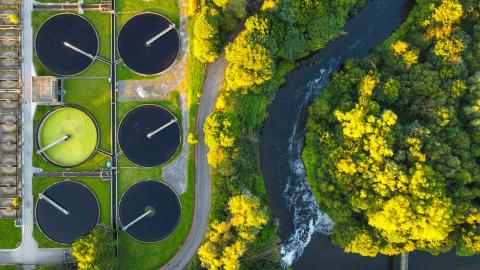European Economic
and Social Committee
EESC renews call for an EU Blue Deal amid growing water crisis
The European Economic and Social Committee (EESC) has renewed its call for a dedicated ‘EU Blue Deal’ in the form of a new opinion on water resilience and industrial development, adopted just ahead of Commission President Ursula von der Leyen’s announcement of a Water Resilience Strategy. Europe’s industrial future hinges on water, and a recent Eurobarometer reveals Europeans overwhelmingly support stronger action on water issues.
The EESC has been advocating for the EU Blue Deal for over a year, emphasising the need for a standalone strategy focused on water, a critical yet increasingly scarce resource. ‘The Green Deal is not enough,’ stresses Florian Marin, EESC rapporteur on the opinion Industrial and Technological Approaches and Best Practices Supporting a Water Resilient Society. He highlighted the need for a dedicated strategy to ensure the availability of skilled workers, quality jobs, and decent working conditions in the transition to a water-smart society.
The Water Resilience Strategy announced by Commission President Ursula von der Leyen in the new Commission’s political guidelines principles for 2024-2029 shows that the call for an EU Blue Deal is being heard and is gaining traction. At the same time, twenty-one EU Member States have recently urged the European Commission to ‘ensure that water will be a top priority in the European agenda over the coming years‘. Adding to this momentum, a new study by the European Patent Office (EPO) reveals that Europe leads globally in the development of water technologies. The study shows that 40% of inventions in water-related technologies come from European applicants, with Germany, France, and the UK at the forefront of this innovation.
The EESC’s new opinion outlines a comprehensive strategy encompassing both technological innovation and workforce development. It emphasises the importance of water-efficient technologies and sustainable water management policies, including reducing, reusing, and recycling water within industrial processes. It also advocates for public participation to build a water-secure future for all.
Technology alone won’t solve the problem. The EESC emphasises the need for a ‘water culture’ and a workforce equipped to manage water resources effectively. The EU Blue Deal calls for a ‘human dimension roadmap’ to develop the necessary skills for this water-conscious future.
Co-rapporteur John Bryan reinforced the urgency of the initiative, stressing the need for immediate investments in water infrastructure. ‘Investing in water capture, storage, and reuse is critical. Many sectors stand to benefit, and these investments can significantly improve our current scenario,’ Bryan stated.
The strong public support for enhanced water measures adds weight to the EESC’s call for action. According to a recent Eurobarometer survey, 78% of Europeans believe the EU should take stronger action on water problems. The survey also revealed significant anxiety about water pollution, overconsumption, and hazardous chemicals. A significant majority of Europeans express concern over the impact of water-related issues on health and the environment, and believe national stakeholders are not doing enough to use water efficiently.
The EESC’s EU Blue Deal offers a roadmap for a sustainable future, integrating water management into the EU’s industrial strategy. By investing in water infrastructure, data management, and workforce skills, Europe can ensure its industries remain competitive while protecting this vital resource. As Marin stated, ‘Water must be at the forefront of our policy agendas. The future of Europe’s industries, food security, and biodiversity depends on how we manage this vital resource.’
